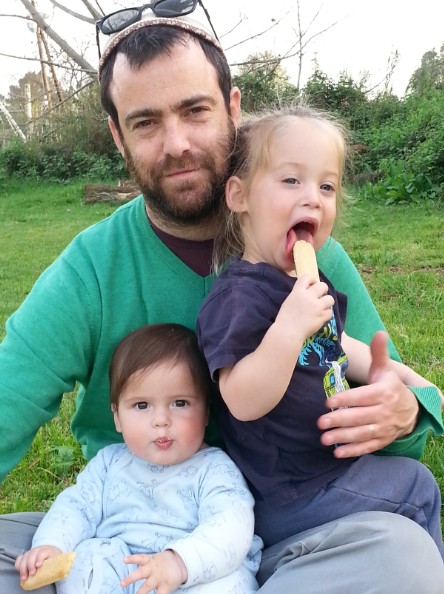The Mission: Coexistence in the Heart of the Kibbutz
Raised in the kibbutz and educated by its values, Eyal Shoham now builds a synagogue and distributes a weekly Torah bulletin there. Discover Shoham's journey to faith in the kibbutz's depths in this touching interview.
 Eyal with his children
Eyal with his childrenFor people like Eyal Shoham, it's only a matter of time before the truth starts to grow inside, dissolving all the lies that were there before. When that time arrived, nothing could truly stop the sacrifice he made for his truth: It began with listening to Torah lectures in secret, followed by the decision to wear a kippah, and ultimately led to initiating reforms and building a synagogue in Kibbutz Sde Nehemia, where he was born and raised.
Despite the opposition to this 'radical step' from various members of the kibbutz, Shoham (35), a hi-tech professional, married and father of two, insists that he never intended to cause disputes or create discord between himself and fellow kibbutz members. "I come from a place of wanting to be a simple Jew. I never intended to cause divisions. Like anyone becoming more religious, I understood the need for a synagogue in my living area and would do the same anywhere else. My goal now is to create balance and coexistence between all streams living in the kibbutz. However, if you're telling me not to build a synagogue because it contradicts your view, then to me that's coercion. When you try to cast out religiosity and everything connected to it, I see it as a form of extremism just as troubling as any other."
With his dedication, one might mistakenly think that Shoham was born religious, but the opposite is true. Not only was he born and raised as a staunch secular, but his grandmother was among the kibbutz's founding settlers. Until age seven, Shoham lived in the United States, his mother's birthplace, and even in the diaspora, the family maintained a certain religious connection, such as keeping kosher and making *kiddush* on Friday nights. "The only 'mistake' my parents made was placing me in a religious kindergarten at age 4. I still fondly remember the experiences I had there." Who knows? Maybe these childhood experiences planted the seeds for his spiritual return in adulthood.
At what point did you realize you were missing something and turned to Judaism?
"As a contemplative and searching person, I went through numerous ups and downs. I traveled extensively, attended spiritual workshops in various forms, explored and examined numerous methods, but my spirit was restless and never satisfied for a moment. I knew I was missing something, just couldn't define exactly what it was, until suddenly, without any prior knowledge, I felt an urge to learn about Judaism."
 Eyal with his children
Eyal with his childrenThe path to Judaism slowly paved its way to his heart. "I read a lot, watched numerous lectures, including on the Hidabroot Channel. To my surprise, it worked. I felt the answers I was receiving were genuine, and there was no need for me to wander to foreign or strange doctrines."
What was the hardest part of this journey for you?
"Wearing the kippah was my biggest challenge, not because it didn't align with the spiritual work I was doing. Quite the opposite—blessing, praying, keeping Shabbat, putting on *tefillin*, all of it was within my capabilities. Everything went well, and even if there were difficulties, they certainly weren't on the level of an internal struggle. Moreover, I'm someone who checks every path before embarking on it, but once I take the first step, there's no such thing as not completing the journey. I knew that wearing a kippah meant walking my path to the end, without regrets, in such a way that there was no turning back. Thus, the public display was the most challenging aspect for me."
From Manual Labor to Fear of Heaven
Difficult, yes, but truth is truth. Once you find it, there's no escaping it, and you can't live without it. Alongside his decision to wear a kippah, Shoham made several other significant life decisions, such as taking the religious aspect of kibbutz life a step further by establishing a synagogue for traditional-religious residents. However, this somewhat bold move sparked numerous negative sanctions from various elements within the kibbutz. "I can understand that," he smiles at me, a spark of kindness in his eyes. "I was brought up under the same values, and it’s very likely I would have reacted as they did if I were in their place. I try to approach it positively, to be sensitive to people and their needs. On the other hand, I think these negative reactions represent the majority of kibbutzim in the country, who go to an extreme when it comes to integrating Torah values with permissive ones. My aspiration is to create balance, to make the Torah accessible, so people can get to know the 'monster' they so fear. Unfortunately, the education I received painted religious people in an anti-light. I was filled with the idea that religious people are corrupt, and today I discover the opposite is true. It's a shame it's like this. We can connect with each other in a much more complete way, where everyone knows their level and perspective, and therefore does not feel threatened when asked to approach a different lifestyle."
Shoham had to muster immense inner strength to get through this tough experience, standing before all the opposing forces, pushing forward against all odds. There were also numerous other trials during this process, such as when they were required to pay 250 ₪ for half an hour of prayer in one of the kibbutz rooms. However, according to Shoham, the entire process was accompanied by significant divine assistance (*siyata dishmaya*) without which, it probably wouldn't have happened. "It started with me and another student who began to become more religious, and slowly, more people joined us. We'd sing Carlebach songs and just enjoy life."
After prolonged discussions, when the kibbutz council decided to offer them the shelter, the group rejoiced enormously. With the help of the 'Ayelet Hashachar' organization, which volunteered to gather Torah scrolls and other needed items, their synagogue was established in no time. In the absence of funds for staff, Shoham took upon himself responsibilities like leading the services, reading from the Torah, cleaning, organizing donations, preparing sermons for Friday nights, and even writing weekly Torah articles for the kibbutz newsletter. But that's not all: due to his efforts, Shoham's father also strengthened his faith, serving as his right-hand man for all synagogue needs, including finding enough men for a minyan. "Despite all the difficulties and opposition, today we are in the midst of building a new, well-resourced synagogue from the ground up," says Shoham, adding, "I was sure everything would work out in the end. This is one of the areas where I've changed the most in my journey of faith. Whereas before, I felt everything depended on me and behaved as if it did—now I'm a different person in that respect. I've calmed down. I know it's my duty to make an effort. Beyond that, everything is in the hands of Heaven."

